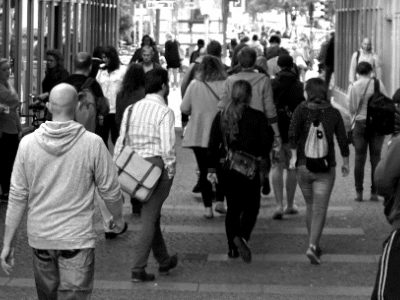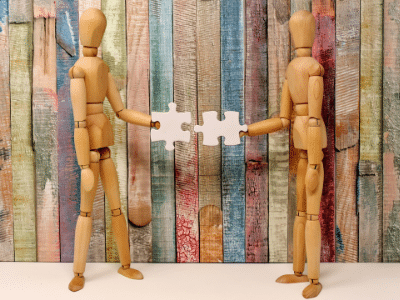

We all go through times when we are feeling alone and sad. Whether you're dealing with one particular crisis, the strain of world events, or just the cumulative effect of a difficult few months, there are times when life feels like too much to handle – even when you're talking to friends.
In such cases, it can be tempting to just shut the curtains and do nothing, but this is likely to simply postpone your unhappiness.
So, what should you do when you're feeling overwhelmed and isolated?
We'll give you some strategies to use, no matter why you're feeling alone. For example, perhaps you feel like you're no longer connecting with your social group, maybe you're struggling with an unhappy or recently finished relationship, or perhaps you really don't feel like there's anyone to turn to.
Regardless of your situation, our range of techniques can help you feel better during the most difficult times.
If you're reading this, chances are that you're feeling alone right now. Maybe you've just been through a particularly tough experience, or perhaps this is a recurring theme in your life.
First, let's look at how to combat loneliness in a crowd before we turn to the loneliness you can feel when you're with friends.

It sounds like a cliche, but sometimes there's nothing more painful than feeling alone in a crowded room. If you've joined a club, a gym, or a class and are wondering why you're more lonely than ever, try the following:
Address anxiety you might be feeling. Are you hanging back or staying quiet because you're afraid you'll be rejected?
Journaling or therapy can help you get to the bottom of why you assume others won't like you.
Drop any comparisons that might be holding you back.
That happy, bubbly person you see sometimes feels just as lonely as you do right now, so don't assume they're better or more “sorted” than you are.
Consider that you might genuinely be happier in some groups where you can have careful, deeper conversation. There's nothing wrong about being an introvert. If this is you, how can you change your life to reflect this?

If you've established that you not only feel lonely in a big crowd but also with people who are supposed to be your friends, the situation is a bit more complex. Here are three tips to help you begin addressing the issue:
Ask yourself if you've outgrown your friends. Perhaps they're your friends from school, for example, and your lives have taken different paths. Is it time to look for new connections?
If you're trying to put a brave face on so that your friends don't know your struggles, consider that this stops them from knowing the real you. Try sharing a bit of the truth, and see if the loneliness begins to dissolve.
Are there unresolved issues in the group, such as resentments under the surface or past conflicts that went unaddressed? Consider speaking up about the need to deal with the past, in the name of bringing your friendship group closer again.

Lots of single people who feel lonely find themselves yearning for a relationship.
After a breakup, it's also common to feel a crushing sense of loneliness and to structure with the new shape your future is taking.
At such times, it's easy to think that having a partner will solve any sense of being isolated or misunderstood and that it will bring a reliable source of unhappiness.
However, the truth is that loneliness can persist into a relationship. You can also become lonely over time as a relationship (and the people in it) begin to change.
That said, you don't have to stay lonely. Let's think more about this.

Feeling alone in marriage almost always boils down to difficulties in communication. If you feel misunderstood, and so does your partner, the gulf between you constantly widens.
In that environment, resentment builds, and the motivation to fix things can be lost. Here are some things to try in order to restore a sense of closeness:
Practice active listening. When your partner is telling you something (especially if it's contentious), paraphrase it and say it back to them to check that you understand. Ask your partner to do the same.
Reminisce together. What are some of your favorite memories? What are the things that drew you to each other?
Proactively organize time together. If your family or working lives are busy, it's easy for this to fall by the wayside. Schedule quality time, and try to come up with new things to try together to keep the relationship fresh and to generate even more to talk about.

Break-ups can be incredibly painful, even if you don't think you and your ex-partner were truly right for each other. But what should you do with the empty space they leave behind? There's no one correct way to react, but these ideas may help:
Treat the breakup like a grief process. Expect that it won't be linear, and acknowledge that you'll have mixed feelings about it. Give yourself space to express those feelings, to people you trust.
Ask yourself, what is there now room for in your life.
Was your relationship holding you back from a career change? From moving to a different country? From starting a family? Look for ways to make this traumatic experience a launchpad for your development.
Figure out what this experience teaches you about what you want and don't want in a partner. Remember that every love and loss keep you on the path to the person you're meant to be with.
When you feel alone and sad, it's always good to have some generic strategies that can immediately lift your mood and change your perspective.
While it is important to acknowledge and understand your sadness, forward momentum will stop you from stagnating. Here are five further ideas that will help you deal with loneliness.

Being vulnerable often feels scary. When you're vulnerable, you let someone see your authentic self, and this can make you fear rejection.
However, being vulnerable is also the doorway to increased closeness and understanding.
So, when you're lonely, think of someone you can be vulnerable in front of, and let them see your distress. This can be a friend, a family member, or a therapist.
The power of vulnerability lies in its ability to bring us closer to others, and in that closeness comes validation.
It doesn't matter if the other person doesn't have a solution to any problems you face – you'll feel better simply for being heard.

Positive thinking is incredibly powerful, so use that to your advantage.
Even in times of loneliness, there will still be some things that make you feel grateful – you just have to look for them.
Try keeping a gratitude journal, and write it at least once a day.
Then, anytime you need to be reminded of the good in your world, open it up and have a look.
Remember to add both small and big things.
So, don't only include promotions or other milestones – including beautiful flowers you see, moments of connection with another person, times you laughed, and songs that touch you.

As noted above, nature provides ample opportunities to feel grateful. In addition, studies show that people's mental health improves when they spend time outdoors, breathing fresh air, and connecting with the natural world.
Find a place to take a walk, or sit reading a book. Even just 20-30 minutes can make all the difference to your mood. And if the weather is bad, why not go somewhere with a dramatic view and take in the beauty of a storm?
As you commune with nature, remember that the energy of everyone and everything is connected. In one important sense, you are never truly alone.

When we are sedentary, our energy becomes stagnant. We get sluggish, our thinking slows, and our mood dips.
Consequently, one way to immediately fill yourself with positive energy is to get moving.
This prompts endorphins – the body's “happy hormones” – to flood your body. Any form of exercise will do this for you, so find something you like.
Whether it's jogging outdoors, taking a spin class, dancing alone in your bedroom, or swimming laps after work, get your body moving and notice what it does to your mood.
And you're at home all day and feeling lonely, a 5-10 minute walk can snap you into a new state.

Finally, even if you're disenchanted with your current friend group or feel lonely where you live, there's always an opportunity for connection.
For example, you might join an online group that shares one of your interests. Alternatively (or in addition), look into what's happening locally.
Are there classes or book groups looking for members? Are there places to volunteer, or events that might interest you?
All of these experiences present opportunities for connection and friendship, even if only indirectly. You may be surprised by how many people around you are also feeling lonely and sad, and will be very open to the connection if you offer it.
Did you know that practicing The Law Of Attraction techniques can also help you deal with loneliness and sadness? When we vibrate at a low frequency, we end up feeling more melancholy.
Like attracts like, and so our lives continue to be underwhelming, repetitive, and isolated. However, when we use targeted exercises that raise our vibration, we become more positive.
As a result, we start to attract more positivity, and our daily life becomes dynamic and satisfying. You can use these techniques not only to improve your mood, but also to draw good things toward you – friendships, relationships, and opportunities.
